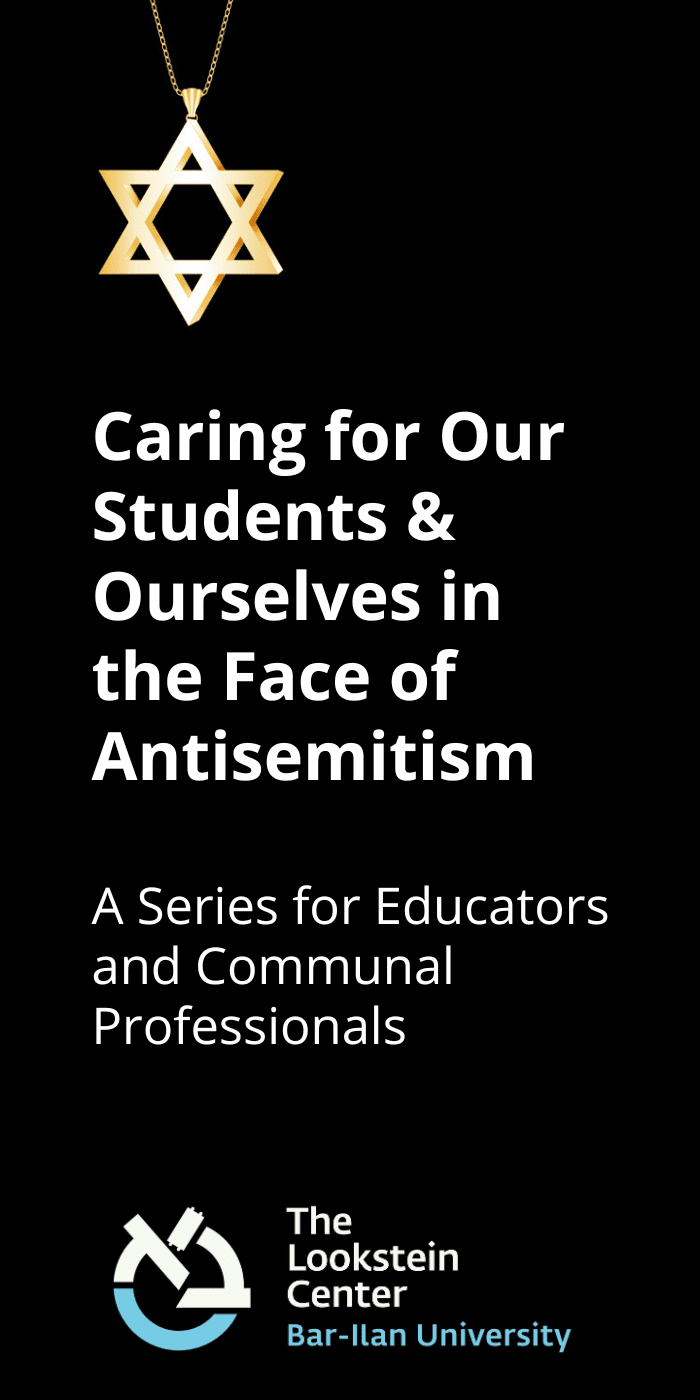A Plan for Jewish Education in the UK
The following is excerpted (with permission) from a June 2022 report, After Covid: The Future of Jewish Education in the UK, A Community Project. The very existence of such a project, in which a community-based non-denominational organization (UJIA) joined with a denominational institution for adult Jewish learning (LSJS), marks significant forward-thinking. The report itself contains numerous innovative ideas for planning the future of Jewish education in the UK, and serves as another example of how being prepared to re-examine the basics can open doors to new starts.
The questions they sought to answer in this partnership included:
- How do we create opportunity out of the crisis?
- How might we re-envision our educational organizations?
- How can we harness the opportunities afforded by new technology and what are its limitations?
- How have our young people’s attitudes to learning shifted and what does that mean for the way in which we teach and engage them?
- Are we best supporting and valuing the teachers and educators we entrust with our children and what status do they have in our community?
Note: The italics and the hyperlinks have been added by Jewish Educational Leadership.
6.11 Training opportunities
Training programmes for informal educators and community professionals should be prioritised. For example, there should also be opportunities to add to what is currently offered by LSJS, Reshet, PaJeS, and TalentEducators for development of early and mid-career educators including leadership training, support with further learning and career progression, and mentoring. There should be development of increased pathways into education, for example, the primary Jewish Studies route into teaching – possibly including more creative ways through early career development to make sure Jewish Studies at primary level is fully supported, looking at a route that fits into current structure rather than adding (there is potential for this through LSJS). In all sectors of Jewish education, we would benefit from support for recruitment from comms or PR agencies that could support pitching of messaging when recruiting. It will be important to ensure high quality mentoring is provided and framed well through training and development in order to become embedded in the culture of the community and profession. Leadership programmes should identify and target a range of groups to work with, including groups of parents and grandparents, teachers, informal educators and youth leaders, rabbis and community leaders, post-university leaders.
6.13 Funding
Existing immersive programmes (e.g. camps and tours) can appear to be targeted only at a core or elite grouping who are already affiliated, and are certainly financially prohibitive. (Notwithstanding bursary schemes which not everyone is comfortable accessing.) The Jewish community must collaborate to put together lower cost, open and inclusive programmes. Funding for young people post-22 (after the University years) should be prioritised to encourage that age group to remain within the community. The community should prioritise investing in educator development, for example for trainee teachers, especially in JS, as well as for informal Jewish educators. A Jewish family educator scheme for graduates could promote family education in the community with energy and skill. We need to make the case to the major philanthropic supporters of the community to take risks with their funding. Education can only be judged a success based on its outcomes, and as such, the success cannot be known beforehand. The community has to have a level of tolerance for failure that does not “blame” good ideas.
6.15 Wellbeing offers
It is important that we work together with the specialist agencies working in this area. Mental Health First aid should be widely available and should be a core skill requirement across all educational settings, both for educators and learners. All educators should be offered a number of well-being sessions annually. For young people, we should set up localised endeavours, e.g. a playground befriending initiative, operating in a school or synagogue, delivered by youth movement madrichim.
6.16 Micro-grant schemes
Micro-grant schemes have been demonstrated to work. They promote innovation and catalyse partnerships. (The UJIA Cheder Challenge in 2008 fostered over 20 innovative projects with a total budget of £70,000.) Grants of up to £5,000 (but possibly as low as £500) could be offered to projects, who subscribe to the key principles and priorities across the following categories:
- Projects within a sector e.g. two schools working together on a project
- Collaborative projects across at least two different sectors (i.e. not just two synagogues)
- Experiential learning
- Family Education
- Workforce development
An example of where micro grant schemes have been happening successfully in the past two years is UJIA’s summer engagement and winter engagement funding scheme. A micro-grant scheme is not just, or even primarily about money. It is about recognition and support including, for example, a mentor for each project.
6.193 Culture change/raising awareness
We need to re-develop marketing campaigns to shout about why “it’s cool to work in a Jewish school”, (a campaign that was developed with PaJeS some years ago), why Jewish Youth Movement work is an amazing opportunity, why “doing Jewish” with your family is the best part of the week, and so on.
The community must find ways to move educational establishments from being ‘Competitive to Collaborative’, enabling schools and youth movements to work together with synagogues and other institutions to join up thinking in Jewish learning. We should enable conversations to support the development of the sector and shared understanding of appreciation and value. Specifically, a much more powerful prospect is to develop a culture of promoting this shared culture rather than competing with each other. There is scope here for a conference or event to launch a “communities of practice” and related concepts.
6.25 Recruitment and retention
Recommendations in this section often link to funding initiatives. We need to consider the development of funds or paid sabbaticals to support development and meaningful training with the ambition that this would, in turn, support retention and attracting talent. Currently LSJS and TalentEducators both work to recruit teachers. Yesod also support development in this way currently. A financial incentive to attract people into positions within the sector could boost recruitment. Other initiatives, for example paying family synagogue membership, paying for educators’ children to attend summer camps and Israel Tour, could be a very attractive incentive. Creating an ‘Excellent Teacher/Educator’ programme would enable fast tracking of skills and career progression.
Viewing the Jewish community holistically could incorporate wider and more innovative training and development opportunities into the pathways to enable those in education to move into other educator roles in communal organisations, allowing teachers and educators to transfer their skills into other communal organisations.




